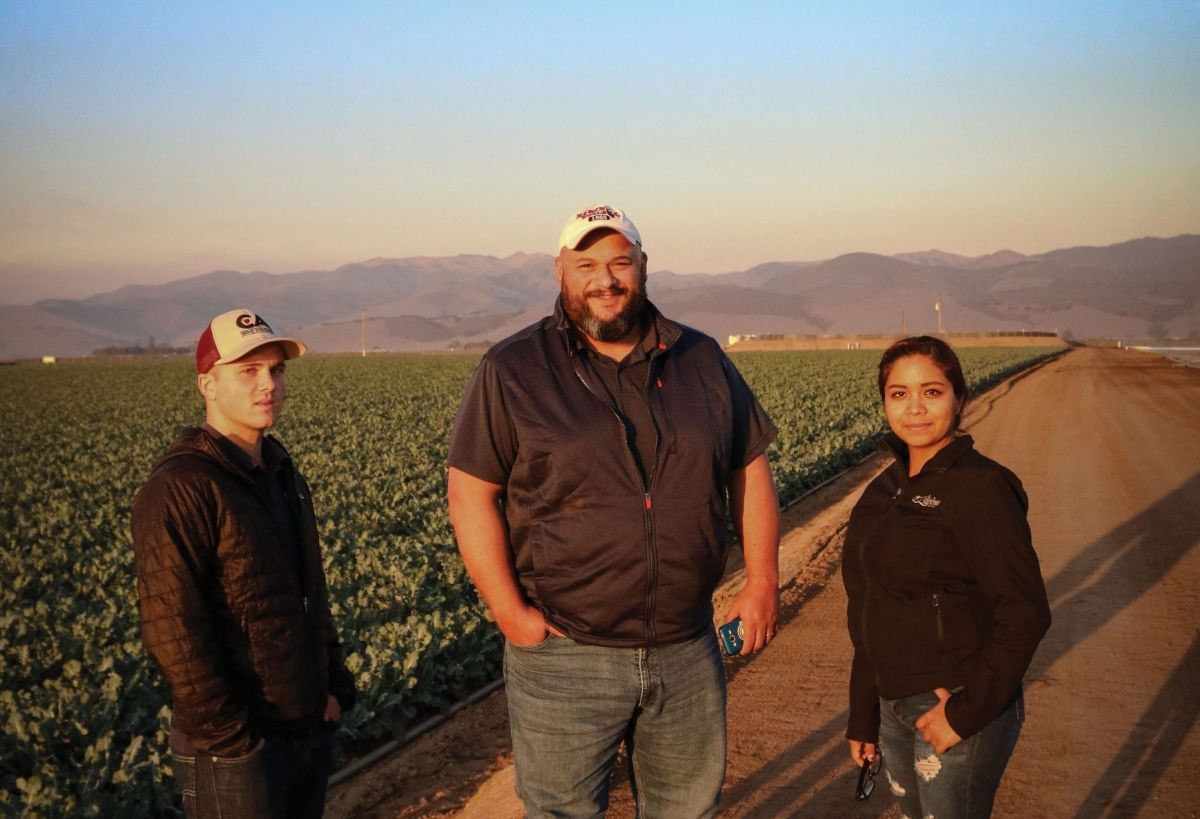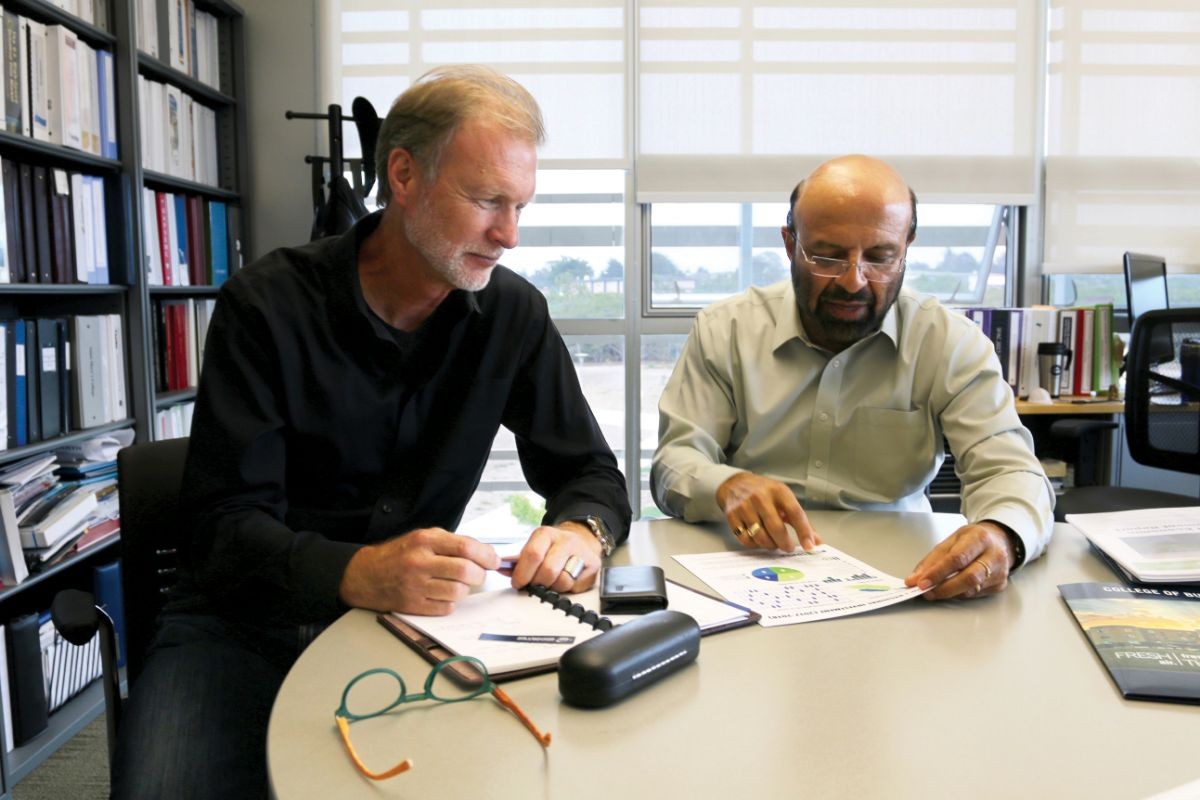CSUMB Magazine
Fueling Entrepreneurs

By Sophia Huang McKenzie
Published Feb. 2, 2019
What do surfboards made from shrimp shells, organic cold-pressed juice and an ag-tech mobile app for farm management have in common?
They’re all products made by winners of Startup Challenge Monterey Bay, an annual competition for entrepreneurs sponsored by the Institute for Innovation and Economic Development (iiED) at Cal State Monterey Bay’s College of Business (COB). More importantly, the entrepreneurs and their businesses are now part of a thriving “economic ecosystem” in Santa Cruz, Monterey and San Benito counties.

“The iiEd has been the fulcrum of the lever to bring the ecosystem into existence,” said COB Dean Shyam Kamath. “If you look at the contribution the iiEd has made, it’s quite fantastic.”
Now in its 10th year, the iiED is well on its way to achieving its vision of building a sustainable economy in the Monterey Bay region. One of the pillars of the university’s strategic plan is to serve as “stewards of place” through regional development, Kamath said. Bright Futures, the university’s cradle-to-career initiative, is improving education, while the iiED is at the forefront of promoting entrepreneurship.
The numbers tell the story: 2,200 aspiring entrepreneurs trained, 525 participating companies, over 150 jobs created, and more than $10 million in capital raised by companies. That’s the official figure, anyway. It’s likely closer to $15 million or perhaps even $20 million, according to Brad Barbeau, iiED executive director.
“It’s actually over $20 million, but who’s counting?” Barbeau said with a laugh.
“If you think of the jobs, the entrepreneurship that’s created, the businesses that are started and get funding … We’re being conservative. We can’t keep track of it all!” Kamath added.
Startup Monterey Bay
The iiED’s mission is twofold: develop the knowledge, expertise and financial resources to create and support a vibrant business community in the region; and collaborate with public and private institutions to develop programs and events that connect the university and the local economy to the global marketplace.
The iiED also acts as a prime provider of entrepreneurial education to CSUMB students to “fuel their American Dream” and provide them with training, advice and networks to start their own businesses, Kamath said. To those ends, the institute sponsors three major hands-on programs each year for CSUMB students and tri-county community members under the Startup Monterey Bay umbrella. The first event of the academic year is the Startup Hackathon in November, with primary leadership by faculty members from the School of Computing and Design. The three-day competition pairs mentors with student teams from CSUMB and Monterey Peninsula, Cabrillo and Hartnell colleges to create new technology-based solutions to social and global problems.
The Hackathon is followed by Startup Weekend in January. Kamath describes it as a “Red Bull-fueled long weekend” in which students and community members team up for an intensive 54-hour experience building new startups and businesses. It connects students, developers, designers, entrepreneurs and startup enthusiasts with mentors and resources to share ideas, form startup teams and launch businesses.
Startup Challenge, the culminating event, kicks off in March. It’s a three-month contest for entrepreneurs, startups and new companies to hone their ideas and business concepts, seek expert advice from mentors and vie for more than $50,000 in prize money. Applications are submitted in March, a qualifying round follows in April, then the final round called “Otter Tank” -- modeled after the popular TV show “Shark Tank” -- takes place in May.
In addition to its three main events, the iiED hosts a monthly Startup Tech Meetup at the Monterey Bay Incubator in Pacific Grove. It’s a gathering for aspiring entrepreneurs, innovators, local startups and business people to share ideas and information. The institute also co-sponsors numerous other expos, forums and symposiums during the year.
The iiED is building global reach through a partnership with Thammasat University in Bangkok, Thailand. The institute hosts an American Business and Entrepreneurship Program for Thai business managers. They come to CSUMB twice a year to visit area companies and attend lectures and presentations.
Keys to Success
Kamath credits the institute’s success to the leadership team of Barbeau, Program Manager Mary Jo Zenk and Founding Director Eric Tao, a professor in the School of Computing & Design.
“It takes a very special kind of focus and a very special kind of capability to get something like this going and keep it going for nine years now. Brad, Mary Jo and Eric have formed this team of three people who have continually innovated. This is innovation at its highest level,” Kamath said.
“A tremendous amount of work goes into setting up these events. Bringing together the resources, bringing together the people, bringing together the judges, the mentors, attracting the students to be there. It’s Brad and his team and whatever I can do to fundraise or bootleg whatever resources I can to support them.” The iiED leadership team recently added a fourth member, Dan Ripke, as director of economic development. Ripke wants to identify challenges facing regional communities, industries, and businesses. He also is seeking to obtain contracts and grants to fund the iiED sustainably and to find opportunities for the faculty and students to work collaboratively with public and private sector entities.
While a key role of the university is to develop minds and confer degrees, the role of a university in supporting regional economic development is also a vital one.— Dan Ripke
“While a key role of the university is to develop minds and confer degrees, the role of a university in supporting regional economic development is also a vital one,” Ripke said. “This provides iiED with a unique opportunity to have a full-blown research, consulting and entrepreneurship development program that can be fully funded through contracts and grants.”
Barbeau said Kamath’s support, from his enthusiasm to his national and international academic and business connections, have been vital to the institute.
“His willingness to jump in and actually participate in the events, sometimes just being there as head cheerleader, but he’s done so much more. He brings in coaches and mentors and speakers. He uses his connections to support us. It would not be happening without him,” Barbeau said.
The unflagging interest of supporters in the community and among students and faculty have also been instrumental to keeping the institute and its programs going.
“The entrepreneurial spirit of the area is what I depend on. Students love to do the hands on work, taking a shot at starting a business, getting in there and developing technology,” Barbeau said.
The iiED events are integrated into the courses offered in the entrepreneurship concentration of the college’s undergraduate degree program and are integral to student success in their professional lives, Kamath said.
In addition, a network of about 100 active volunteers serve as mentors and judges at iiED events. The volunteers include community members, successful business people, alumni and university faculty.
“We reach out to the community and to the university to include the whole university. It’s not just the business students or just the tech students,” Kamath said.
Beyond the Valley of Death
While the typical survival rate for startup companies is only 2 to 3 percent, the iiED’s percentage has been significantly better at 5 percent. Even so, the institute wants to do more to help startups avoid what Barbeau and Kamath call “the Valley of Death” after launch.
“We wave goodbye, and it really is goodbye for most of them. Their startups die,’” Kamath said. “An early incubator service is going to make all the difference.”
At the end of last year, the iiED was in the process of applying for a $1 million grant from the U.S. Economic Development Administration to provide early incubator services for fledgling businesses.
“What we’ve done so far is provide opportunities for businesses to get started. We bring people in, we have an intense time with them, we mentor them through Startup Challenge and help them drive their businesses forward,” Barbeau said.
“What we haven’t done yet is to work with those companies consistently over time and provide mentors and workshops, because these very early stage companies need that nurturing to bring them along. It takes two, three, four years to get a company off the ground. It’s not a two-month project. They need that consistent help. That’s the next stage. We’re always looking to the next stage.”
Diversifying the Region
Tourism and agriculture have long formed the foundation of the economy in the Monterey Bay region. The iiED is building on that foundation to grow companies that will provide the jobs of the future and keep college graduates in the region.
“It’s regional development that goes beyond agriculture and hospitality, it diversifies the region. It brings tech companies, companies in food processing, companies in recreation and healthcare. … It essentially makes the region more resilient,” Kamath said.
While much has been accomplished, Kamath believes just 30 percent of the necessary work has been done. They’ll reach 60 percent when the early incubator services are in place, then the next piece is to combine and collaborate with all the other entrepreneurship institutions in the region. This includes Thrive, Santa Cruz Works, Western Growers Center for Innovation and Technology, Kamath said.
“Then we’ll have this entrepreneurial ecosystem firmly established.”
Read a related story about successful winners of Startup Challenge Monterey Bay, the iiED's annual competition for entrepreneurs. Learn more about the College of Business and how to get involved with iiED.